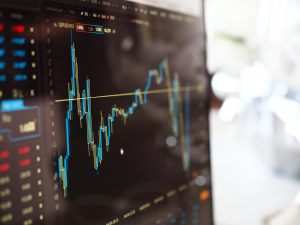by Franklin Templeton Investments blog, Franklin Templeton Investments
Global equities finished last week slightly higher overall, after a quieter few days for macro newsflow. Focus turned to corporate earnings season as companies began to report on their first-quarter results. Sentiment changes around this reporting drove many of the intra-day sector moves we saw last week.
The Digest
Cyclical Rotation Pauses
 Last week proved quieter for macro themes, but we did observe a pause in the cyclical rotation we had seen in the previous week.
Last week proved quieter for macro themes, but we did observe a pause in the cyclical rotation we had seen in the previous week.
In the week heading up to Easter, cyclical sectors had been strong outperformers while defensive stocks were among the underperformers during that same period: health care, real estate and utilities.1
This had been a general theme year-to-date as we’d seen risk-on sentiment come back to global equities. However, last week we saw a clear pause to this rotation, with many of the earlier outperformers lagging. By contrast, the previous laggards were strong.
Last week, autos fell in Europe after a series of fairly weak quarterly reports from some prominent names. Banks were also weaker. Again, some weak earnings reports in the space appeared to be driver of the weakness, as well as news that talks on a significant merger within the sector had collapsed.
On the flip side, the defensive sectors saw some relative strength last week: Health care, food & beverage and utilities were all among the outperformers. The previous rotation out of health care reversed rather aggressively last week, with the sector showing its highest weekly gain of the year. Health care stocks had sold off globally the previous week on concerns in the United States around reports that the Democrats plan to introduce a Medicare-for-all bill that would effectively create a new publicly funded health care system.
Earnings in Europe drove most of the health care strength last week, with several big names reporting higher-than-expected earnings for the first quarter.
Technology was the exception to this sector-rotation theme last week; a sector which has been the global outperformer so far this year. Technology stocks remained strong last week as a series of earnings reports beat expectations, setting up the sector up for another strong showing.
Crude Oil Price Moves
 Commodity price moves were a relatively hot topic last week.
Commodity price moves were a relatively hot topic last week.
Reports that US President Donald Trump would not be renewing waivers to purchasers of Iranian oil helped buoy oil prices through the early part of the week, driving new year-to-date highs in West Texas Intermediate (WTI) crude oil.
Currently, waivers are in place with countries such as China, India, South Korea and Turkey to allow these countries to import Iranian oil without incurring sanctions from the United States. However, reports indicate the Trump administration intends not to renew these waivers when they expire on May 2. Expectations of a resultant further tightening of supply from Iran sent WTI prices higher.
However, this was rather dramatically undone towards the end of the week amid reports that the Organization of the Petroleum Exporting Countries (OPEC) would have enough capacity in oil reserves to replace any supply lost by Iran.
In addition, on Thursday, US Energy Information Administration (EIA) data showed inventories reaching the highest levels since October 2017. WTI prices dipped and oil stocks felt the knock-on effect, not helped by some weak reporting in the space. Ultimately, the price of oil ended at a loss of 1.2% last week.
Upcoming Catalysts
While last week was light on macro newsflow, we expect a series of data and announcements this week which may provide some form of market catalyst.
Spanish Elections
In recent years, concerns over the political landscape in Spain, especially around Catalonia, have moved equities both domestically and throughout the continent. As the polls widely predicted, the country’s general election over the weekend resulted in a hung parliament, with the Socialists emerging as the largest party.
US Macro and Monetary Developments
With data in focus and driving central bank sentiment, we will be watching this week’s US inflation and employment data closely for any market moving reports. The Federal Open Market Committee (FOMC) meeting on Wednesday is likely to prompt investor interest as usual. US Treasuries rallied last week after some speculation about the potential for an interest-rate cut. With a raft of data due out throughout the week, any movement away from the recent dovish tone will certainly be of interest and could provide a catalyst for markets globally.
Chinese Growth
Chinese April purchasing manager index (PMI) figures are due out on Tuesday (April 30) and will be watched very closely. Economic momentum has shown some relative improvements lately, so markets will be keen to see if this is to continue. However, with sentiment improving, if the report does disappoint, then this data point could provide a key catalyst to the downside for global equities.
Trade Relations and Brexit
We expect trade talks between the United States and China to resume in Beijing this week. In the United Kingdom, Prime Minister Theresa May is expected to resume talks with the Labour Party this week to try to find a way through the Brexit impasse.
Last Week
Europe
Macro newsflow was more limited last week with most European markets closed for Easter on Monday. As a result, investor focus was primarily on corporate earnings. Performance across the region was somewhat mixed thanks to these first-quarter reports, and there was a notable divergence between the sector winners and losers as discussed above.
The UK Parliament was back to work last week. Much of the discussion centred on the likelihood that the United Kingdom may have to contest European Parliamentary elections in May. Polling for that event is eye-catching as Nigel Farage’s new Brexit Party has seen a surge of support at the expense of the embattled Conservatives.
From a market perspective, this is important as it could push Theresa May back towards a hard Brexit, in order to stop the haemorrhaging of support from her party. That would be negative for equity markets so this will be a key dynamic in coming months.
Americas
With corporate earnings newsflow dominating last week over macro news, it was another strong week for US equities overall. Health care and communication services stocks were the outperformers last week, while energy and materials lagged amid commodity weakness.
In terms of macro data, the highlight last week was first-quarter US gross domestic product (GDP), which came in higher than expected. Some commentators did question the quality of the beat, however, suggesting volatile components such as federal government spending and net trade drove growth.
Asia
It was a mixed week for equities in the Asia Pacific region last week, with China the clear underperformer. A selloff of Shanghai-listed equities came after comments following the prior week’s Politburo meeting that suggested authorities may scale back stimulus measures.
Japanese stock markets closed the week higher ahead of the longest market shutdown since World War II. Japanese markets will be closed between April 27 and May 6 for a combination of Golden Week and celebrations to mark the succession of the new Emperor.
A dovish tweak to guidance from the Bank of Japan helped Japanese equities ahead of the market’s close. Rates were kept on hold as expected. In addition, the central bank specified rates should remain at extremely low levels until spring 2020. This is the first time the bank has put a date in place of the “extended period” it usually refers to. Of course, this does also demonstrate that the Bank of Japan is concerned about slowing growth.
Australian equities were the region’s outperformers amid weakness in the Australian dollar on the back of growing speculation of a rate cut from the Reserve Bank of Australia (RBA) as early as May or June this year.
Week Ahead
It should be another busy week for earnings season, and we also expect to hear from a number of central banks this week.
Politics
- Officials from the United States and China will resume trade talks on Tuesday, so we would expect some resulting headlines.
- Brexit talks resume.
Economics
- Global PMIs will be in focus this week. Nonfarm payroll data is due from the United States on Friday.
In addition, we have:
- Europe: Euro-area flash Q1 GDP and employment rate (Tuesday); euro-area flash consumer price index (CPI) data on Friday.
- US: April consumer confidence is due out on Tuesday, March factory orders on Thursday, Nonfarm payrolls and trade balance data is due on Friday.
- Asia: Hong Kong trade balance on Tuesday, China PMIs on Tuesday, Hong Kong first-quarter GDP on Thursday.
Monetary Policy
The FOMC meeting is scheduled for Wednesday. We also hear from the Bank of England (BOE) on the following day. The BOE is expected to keep interest rates on hold, but there is a chance that policy makers could strike a more hawkish tone if they keep a 2019 hike on the table.
Views You Can Use
Insight from Our Investment Professionals
Smart Beta Investing in the Changing Emerging-market Landscape
Many investors view “smart beta” within the realm of exchange-traded funds (ETFs) as a replacement for either actively managed or passive investment strategies. Franklin Templeton ETF Specialists Todd Mathias and Rick Felix view smart beta as an additive investment strategy that can complement these approaches. In our latest “Talking Markets” podcast, they discuss the nuances of smart beta while taking a look at the changing investment landscape in emerging markets. Read More.
The Case for Active Gilts Management as Volatility Returns
Investors are having to come to terms with the return of volatility. After several years of relatively stable conditions, the slide in equities at the end of last year and the subsequent recovery in the first quarter of 2019 were a stark reminder not to become complacent. David Zahn, Head of European Fixed Income, Franklin Templeton Fixed Income Group, looks at the implications for the gilts market and explains why he believes an active approach to gilts management makes sense now. Read More.
Bulls Return to Emerging Markets in the First Quarter 2019
After a challenging 2018, investors embraced emerging markets again in the first quarter of 2019 amid supportive fundamentals, including a more dovish US Federal Reserve. Franklin Templeton’s Emerging Markets Equity team outlines what drove market moves during the quarter and month of March, and why Asia remains an area of interest in particular. Read More.
The Answer is Blowing in Brazil’s Wind
Renewable energy production in Latin America has grown dramatically over the last decade. The use of green technology like wind turbines and solar arrays continues to expand, as countries like Brazil seek to improve energy security and lower carbon emissions. Given this energy revolution, the opportunity for investment in renewable energy infrastructure in Latin America is robust, according to Paulo de Meira Lins and Valentina Cumo of Darby Brazil. Read More.
For timely investing tidbits, follow us on Twitter @FTI_Global and on LinkedIn.
Important Legal Information
This article reflects the analysis and opinions of Franklin Templeton’s European Trading Desk as of April 29, 2019, and may vary from the analysis and opinions of other investment teams, platforms, portfolio managers or strategies at Franklin Templeton Investments. Because market and economic conditions are often subject to rapid change, the analysis and opinions provided may change without notice. An assessment of a particular country, market, region, security, investment or strategy is not intended as an investment recommendation, nor does it constitute investment advice. Statements of fact are from sources considered reliable, but no representation or warranty is made as to their completeness or accuracy. This article does not provide a complete analysis of every material fact regarding any country, region, market, industry or security.
Nothing in this document may be relied upon as investment advice or an investment recommendation.
Data from third-party sources may have been used in the preparation of this material and Franklin Templeton Investments (“FTI”) has not independently verified, validated or audited such data. FTI accepts no liability whatsoever for any loss arising from use of this information and reliance upon the comments, opinions and analyses in the material is at the sole discretion of the user. Products, services and information may not be available in all jurisdictions and are offered by FTI affiliates and/or their distributors as local laws and regulations permit. Please consult your own professional adviser for further information on availability of products and services in your jurisdiction.
What Are the Risks?
All investments involve risk, including possible loss of principal. The value of investments can go down as well as up, and investors may not get back the full amount invested. Stock prices fluctuate, sometimes rapidly and dramatically, due to factors affecting individual companies, particular industries or sectors, or general market conditions. Bond prices generally move in the opposite direction of interest rates. Thus, as prices of bonds in an investment portfolio adjust to a rise in interest rates, the value of the portfolio may decline. Investments in foreign securities involve special risks including currency fluctuations, economic instability and political developments. Investments in developing markets involve heightened risks related to the same factors, in addition to those associated with their relatively small size and lesser liquidity.
Past performance is not an indicator or guarantee of future performance.
Links to External Sites
Franklin Templeton Investments is not responsible for the content of external websites.
The inclusion of a link to an external website should not be understood to be an endorsement of that website or the site’s owners (or their products/services).
Links can take you to third-party sites/media with information and services not reviewed or endorsed by us. We urge you to review the privacy, security, terms of use, and other policies of each site you visit as we have no control over, and assume no responsibility or liability for them.
______________________________
1. Past performance is not an indicator or guarantee of future results.
Copyright © Franklin Templeton Investments












